-
 Art of Wellness Acupuncture & Traditional Chinese Medicine (TCM)11704 Wilshire Blvd, Suite 295, Los Angeles, CA, 90025
Art of Wellness Acupuncture & Traditional Chinese Medicine (TCM)11704 Wilshire Blvd, Suite 295, Los Angeles, CA, 90025
myartofwellness@gmail.com310-451-5522 Office Hours
MonClosedTue7:30 am --4 pmWed7:30 am --4 pmThu7:30 am -- 4 pmFri7:30 am -- 4 pmSat7:30 am -- 4 pmSunClosedOur office opens from Tuesdays to Saturdays 7:30 am to 4 pm, will be closed on Memorial day, Independent day, Labor day, Thanksgiving day, Christmas and New year.
-
Recent Posts
- Acupuncture for Sciatica Pain
- Can Acupuncture Help With Bladder Control?
- How to Treat De Quervain’s Tenosynovitis With Acupuncture and TCM
- Chinese New Year 2026: Year of the Horse
- Acupuncture and TCM Treatment for Perimenopause Symptoms
- How to Treat Insulin Resistance With Acupuncture and TCM
- How to Treat Metabolic Syndrome With Acupuncture and TCM
- How to Treat Syncope With Acupuncture and TCM
- How to Treat Thoracic Outlet Syndrome With Acupuncture and TCM
- How to Treat Dupuytren’s Contracture With Acupuncture and TCM
- How to Treat Nutcracker Syndrome With Acupuncture and TCM
- How to Treat Rosacea With Acupuncture and TCM
- How to Treat Perioral Dermatitis With Acupuncture and TCM
- Lymphatic Drainage With Acupuncture and TCM
- How to Treat Turf Toe With Acupuncture
- How to Treat Nerve Pain With Acupuncture and TCM
- Sign up to receive news and updates and get my free report:“The Top 10 Reasons to Try Acupuncture”

February 2026 M T W T F S S 1 2 3 4 5 6 7 8 9 10 11 12 13 14 15 16 17 18 19 20 21 22 23 24 25 26 27 28
Fertility
How to Treat Ovulation Pain With Acupuncture and TCM
By Xiaomei Cai, L.Ac., Ph.D. and Qineng Tan, L.Ac., Ph.D.
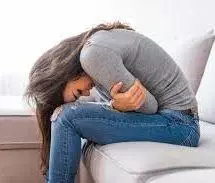
Cramping during ovulation, ovary pain, ovulation pain on one side? Ovulation cramps are very common. Acupuncture and TCM can help ease severe ovulation pain and help with all kinds of ovulation disorders.
The medical term for ovulation pain is “Mittelschmerz,” which means “middle pain” in German. The term Mittelschmerz syndrome refers to the fact that ovulation cramps occur in the middle of the menstrual cycle, typically about 14 days before the next menstrual period.
Studies have suggested that 35-50% of people who ovulate experience cramping during ovulation. Other ovulation symptoms include:
- Ovulation pain on one side
- Pelvic pain, abdominal pain
- Dull ache or sharp twinge of pain in pelvis
- Vaginal pain during ovulation, vaginal cramps
- Cervical cramps, cervix cramps, cervical pain
- Pain around or near the tailbone, tailbone pain
- Back pain, hip pain, or rib pain
- Bloating, bloated stomach
- Fatigue
- Breast tenderness
- Mood swings
- Spotting
- Nausea
- Diarrhea
- Lack of appetite
The process of ovulation involves luteinizing hormone (LH) stimulating follicles on the ovary to mature then break free from the ovary and move through the fallopian tube.
Follicles are like small cysts which stretch the surface of the ovary and then rupture. Blood and other fluids may be released, and this may be part of what causes pelvic pain during ovulation.
Estrogen levels are usually at their highest at the time of ovulation, which can contribute to water retention and uncomfortable bloating in the pelvic area.
For people who are trying to get pregnant, ovulation pain and fertility—or ovulation pain and pregnancy success—may seem related, because the cramping lets them know when they are most fertile.
Many people never notice any signs of ovulation if they aren’t specifically watching for them. For some, ovary pain during ovulation is a sharp cramp that only lasts a few minutes, or a few hours. For others, ovulation pain and pelvic cramps can be so severe that they are debilitating.
Acupuncture and TCM treatment can help relieve ovulation cramps and help regulate hormones to alleviate other ovulation symptoms and problems, as well.
What Causes Ovulation Pain?
Why do some people experience more severe ovulation pain than others? Medical science has not determined exactly why some people experience pain during ovulation and others don’t.
Sometimes ovulation pain can be so bad that people go to the emergency room. In this case, doctors will want to rule out other possibilities. Many conditions can cause pelvic pain, including:
- Appendicitis
- Constipation
- UTI
- IBS
- Celiac disease
- Interstitial cystitis
- Kidney stones
- Gallbladder attack
- Ulcer
- STIs
- Bowel obstruction
- Hernia

Pelvic pain that is related to the reproductive organs can include:
- Menstrual cramps, PMS, dysmenorrhea, painful periods
- Ovarian cyst, ruptured ovarian cyst, twisted ovarian cyst
- Endometriosis
- Uterine fibroids, leiomyoma of the uterus
- Pregnancy
- Ectopic pregnancy
- Pelvic inflammatory disease
- Scar tissue in the pelvic area
- Cancers of the reproductive organs
These conditions not only cause pain, but may interfere with fertility if and when you are ready to conceive.
Endometriosis Ovulation Pain or Ovarian Cyst Pain?
Ovary pain may be related to other issues, apart from ovulation.
Some women begin to experience more ovulation pain when they are going through perimenopause, due to changing estrogen levels.
Ovarian cysts—sacs filled with fluid that develop on the ovaries—are very common. These usually form during ovulation and then go away on their own. However, in some instances, they grow larger, and can cause considerable pain.
Signs of ovarian cyst may be a constant ache, or one that comes and goes, or sudden, sharp pains that happen occasionally. Other ovarian cyst symptoms include: bloating, swelling, and pressure in the pelvic area. If the cyst ruptures, there may be a very sudden, severe pain on one side, and if the cyst becomes twisted or torqued, there may be severe pain accompanied by nausea or vomiting.
Polycystic ovarian syndrome (PCOS) is a hormonal condition in which a person does not ovulate regularly. In many cases, lots of small cysts form on the ovaries, which can cause bloating and pelvic pain.
Ovulation pain can be differentiated from PCOS or ovarian cyst pain mainly by the fact that it occurs only during a specific window of time during the ovulation cycle. If you are using a fertility calculator (ovulation calculator) to track your cycle, then you may be more aware of how your ovulation cycle works and when your fertile window is going to occur.
Endometriosis is a condition in which uterine lining tissues develop in other areas of the body, particularly on the ovaries and fallopian tubes. One of the primary symptoms of endometriosis is pelvic pain, which can be severe and happen at any time during the menstrual cycle. Some people report increased pain during ovulation, as well as severe menstrual pain.
Endometriomas (also known as “chocolate cysts”) can develop in and around the ovaries. There can also be scar tissues, or adhesions, around the ovaries. These tissues may contribute to the increased pain ovulation can cause when you have endometriosis. In these cases, the pain may radiate to other areas, even down to the thighs. Having sex may also be painful around the time of ovulation.
It is important to consult with a health professional if you are experiencing ovary pain, vaginal pain or severe menstrual pain.
PCOS and endometriosis not only cause pain and other uncomfortable symptoms, but can lead to infertility.
If your periods are irregular, or you have reason to suspect that you are not ovulating, it is important to seek health care. Severe pain or missed periods may be sending a signal that there is a deeper issue that needs to be addressed.
Treatment for Ovulation Pain
Ovulation pain may not occur every month. Some people may get relief from occasional ovulation pain by taking over the counter pain relievers like ibuprofen.
If ovary pain is happening frequently and is unbearable, a doctor may recommend hormonal birth control, like oral contraceptives or the Nuvaring. These birth control methods suppress ovulation, and therefore prevent mittelschmerz. However, hormonal birth control can have other negative side effects, and is not suitable for those who may be trying to get pregnant.
Can Acupuncture Help Ovulation Pain?

In TCM, we see ovulation as being a transition from Yin dominant energy to Yang dominant energy. The Yin energy has built up to the point when the egg is released, then Yang energy warms the uterus to prepare it for potential conception.
If there is stagnant Qi (life force energy) in the organ systems, this can cause the intense cramps some people experience during ovulation.
Acupuncture treatment, herbs, and the right nutrition can help move Qi and blood. The smooth flow of Liver Qi, in particular, is essential to not only enhance fertility, but to help ovulation and menstruation occur without blockages that cause pain.
Acupuncture and Chinese herbs have been shown to help relieve all types of gynecologically related pelvic pain, including endometriosis pain, menstrual pain, and period back pain.
Acupuncture treatment has a natural effect on the key hormones involved in follicle development, ovulation, and menstruation: estrogen, progesterone and prostaglandins. Balancing these hormones can help to regulate ovulation when it is not occurring, and also to help relieve cramps, tension, and other symptoms.
Top 3 Acupressure Points for Ovulation Pain
Here are some acupoints for ovulation cramps that you can use to help relieve pelvic pain.
- “Sea of Qi” CV6 – 1-2 inches below belly button, massage in a circular motion for at least a minute
- San Jiao Jiu CA6- 2 points that make a triangle with the navel, press firmly
- Zigong Ren Channel 3 – 4-5 inches below the belly button, press firmly for a minute
Acupuncture Near Me for Ovulation Pain
Whether you are experiencing monthly ovulation cramping, not sure when or if you are ovulating, or suspect that you may have PCOS, endometriosis, or fibroids, TCM and acupuncture offer a highly effective alternative treatment for gynecological issues. The doctors at Art of Wellness are highly respected experts when it comes to fertility treatment and women’s health. Their unique knowledge of Western gynecology and obstetrics combined with TCM allows them to work with you and your individual situation.
*This article is for education from the perspective of Traditional Chinese Medicine only. The education provided by this article is not approved by FDA to diagnose, prevent, treat and cure human diseases. It should not stop you from consulting with your physician for your medical conditions. Traditional Chinese Medicine is based on Qi, which is an invisible force that usually cannot be observed by modern science. Because science focuses on testing ideas about the natural world with evidence obtained through observation, these aspects of acupuncture can’t be studied by science. Therefore acupuncture and Chinese herbs are often not supported by double-blind, randomized trials, and they are considered alternative medicine therapies in the United States.
How to Treat Oligospermia With Acupuncture and TCM
By Xiaomei Cai, L.Ac., Ph.D. & Qineng Tan, L.Ac., Ph.D.
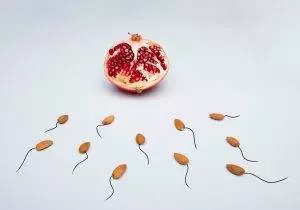
If you and your partner have been trying to get pregnant but it hasn’t happened yet, maybe you are concerned that it could be due to male infertility, or low sperm count, also known as Oligospermia. Male factor infertility is an issue in 40-50% of cases when a couple is having trouble conceiving. Acupuncture and TCM herbs offer a male infertility treatment that can help improve sperm production, increase sperm count, and help men produce healthy sperm.
Infertility in men is more common than you might think. Statistics show that infertility increasing worldwide is an issue, as many couples are having trouble conceiving. Roughly one in ten couples find that they are not able to get pregnant without some form of fertility treatment. Most men don’t know they may have this problem until they are trying to get their partner pregnant and things aren’t working. When couples go in for a female and male infertility test, about half of the time they find that male fertility is compromised. The cause of infertility in male can be due to many variables, so it may take more testing to discover why there is a problem. In many cases, infertility in men and women is never fully explained medically.
You can take a sperm count test at home, but that doesn’t tell you the whole story. A fertility test for men, or semen analysis, performed through a doctor will give you more information about sperm motility, sperm shape, the concentration of sperm in your semen, the Ph balance of the semen, and other details that may help to determine if there is a problem with male factor infertility. Other, more specific tests can show: swimming speed and direction, whether there are antisperm antibodies (ASAs) present, the sperm’s effectiveness at breaking through the outer wall of an egg, etc. Of men who are experiencing problems with infertility, about ten percent have azoospermia, which means a sperm count of zero, or no sperm in the semen. This can happen due to genetic conditions, radiation or chemotherapy treatments, use of some drugs, or anatomical abnormalities.
One of the most common causes of infertility in men is varicoceles, which are swollen veins in the testicles, similar to varicose veins. Varicoceles are not always noticeable, and often don’t cause any problems. However, they can block proper blood flow in the testicles, cause the temperature of the scrotum to rise, and have a negative impact on sperm production. This condition can be treated with surgery to repair the veins, or redirect blood flow to healthier veins.
Perhaps you have already heard about how beneficial TCM treatment can be for infertility in women, but you may not know that acupuncture for male infertility is also effective, whether used as an adjunct to ART (assisted reproductive technologies) treatment for male fertility, or as an alternative to conventional medical treatment. In the case of varicoceles, for example, studies have shown that men treated with acupuncture showed similar improvement in sperm motility and quality to men who had had minimally invasive surgery to help repair varicoceles.
Acupuncture treatment works on many levels, helping to improve blood circulation, reduce inflammation, cool excess heat, boost testosterone and erectile function, as well as helping to optimize overall health by reducing the effects of stress and anxiety, and improving sleep.
Top 10 Cause of Low Sperm Count

Problems with low sperm count and low sperm motility can be related to underlying health issues, or in some cases, lifestyle habits that may affect sperm production.
- Varicocele – swelling in the blood vessels in the testicles that has a negative impact on sperm production and sperm quality.
- Infections – some illnesses, like mumps, or sexually-transmitted diseases, like gonorrhea or HIV, can cause inflammation, damage, and/or scarring in the testicles that can affect sperm health or the mechanical release of sperm from the testicles.
- Ejaculation problems – chronic health conditions like diabetes, the use of blood pressure medications like alpha-blockers, or injury to the urinary tract or spine, can cause problems with the process of sperm being mixed with semen from the prostate and exiting the body through the penis. Retrograde ejaculation, for example, means that semen and sperm are going into the bladder instead of being expelled through the penis during ejaculation. Erectile dysfunction (ED) can also be an issue.
- Immune Infertility – autoimmune disorders can cause antibodies (antisperm antibodies, or ASA) to mistakenly attack sperm as if they were foreign bodies. This can happen in both men and women. (If a woman is producing ASAs, they attack the sperm when they enter the female reproductive system.) Some men who have had a vasectomy begin to develop these antibodies, and then, even after reversal of the vasectomy (vasovasostomy), they still have male infertility issues.
- Blocked tubes – several sets of tubes are involved in proper functioning of the male reproductive system and the male urinary system. If any of these tubes (the vas deferens, epididymis, seminal vesicle, urethra) are blocked, due to infection, inflammation, scarring, or other damage, it can affect sperm making it into the semen and out of the body during ejaculation. BPH and other prostate problems can cause inflammation in this area.
- Hormone imbalance – low testosterone levels or imbalances in levels of FSH and LH, hormones can cause low sperm production.
- Undescended testicles – a small number of male babies are born with one or both testicles that have not descended into the scrotum. In some cases, the testicles will descend within a few months on their own; in other cases, surgery is performed to correct the problem. If a boy grows into adulthood with his testes undescended, it can affect male fertility.
- Cancer or other tumors – a tumor or imbalance in hormones due to cancer (testicular cancer, prostate cancer, or bladder cancer) can disrupt sperm production. Side effects of cancer treatments like radiation, chemotherapy, and hormone therapy can also slow down sperm production or stop it. These side effects can also affect libido and sexual function.
- Chromosomal defects – several genetic disorders can cause infertility in men due to chromosomal abnormalities (Noonan’s syndrome, Cystic fibrosis, Kleinfelter syndrome)
- Celiac disease – While there has only been limited research done thus far, there have been some connections made between male infertility and celiac disease, which is a type of autoimmune disorder. One study suggested that a gluten-free diet helped men with celiac disease to increase sperm count.
Other things that can impact sperm count and sperm motility include the use of recreational drugs like marijuana, opiates, hormone supplements meant to boost testosterone, or anabolic steroids taken to build more muscle mass. Medications used to treat autoimmune disorders, like IBDs, Crohn’s disease, etc., can also affect male fertility.
How to Increase Sperm Count – Medical Treatments

Medical treatment and ART for male infertility depends first on testing to get as clear a diagnosis as possible. If it seems like some infection is causing problems, antibiotics may be prescribed, although in some cases, an extended infection may have already done some damage to the organs involved. If hormone imbalance is the problem, medications that alter the balance of FSH and LH, hormones crucial to sperm production, may be used, including estrogen receptor blockers, or human chorionic gonadotropin. As previously mentioned, surgeries to repair varicoceles can help to restore fertility.
In many cases, though, the exact cause of male infertility is not known. Male infertility is a complex health issue. The physical mechanics of sperm production, erectile function, and ejaculation are all important. It is important to acknowledge that these forces are closely connected to a man’s mental health and emotional health. If there is a lot of stress around trying to get pregnant, stress about having sex, stress in the relationship, or many other issues that may come into play, then the stress itself can have a real impact on sexual function and sperm production. Acupuncture and TCM is a good treatment method to address all of these physical and emotional issues at the same time, without unwanted side effects.
Can Acupuncture Help Male Infertility and Oligospermia?
First, let’s make it clear: acupuncture treatment for low sperm count is not going to involve needles being placed anywhere near the scrotum or penis. Acupuncture works on a subtle level and is relatively painless. Patients usually find it relaxing, and often take a nap during the treatment.

According to TCM theory, both blood and Qi need to flow smoothly throughout the channels of the body, nourishing the organs, for there to be optimal health. This is particularly true when it comes to promoting good reproductive health. Sperms must be ready to move through both the man’s reproductive system and the woman’s reproductive system, penetrate an egg, and start a new life. In order for healthy sperm to be produced, there needs to be a lot of blood and energy flowing to the testicles, where sperm are created.
In TCM, dampness and phlegm are often the causes of blockages. Acupuncture treatment focuses on improving blood flow, not only to testicles, but also to the kidneys and liver. TCM theory considers the kidney to be the keeper of a person’s “essence.” Essence is the life material that we inherit from our parents and pass on to our children. The kidneys are also considered to be responsible for the regulation and transformation of fluids in the body. Strengthening the kidneys, clearing heat, phlegm, and dampness from the organs, and nourishing the blood and Qi are the main focus of acupuncture treatment for low sperm count.
Nutrition, diet, exercise, stress reduction, adequate sleep, and other lifestyle habits are important factors in treating low sperm count. Your acupuncturist near me will go over the details in order to help you choose foods that boost fertility and adjust your routines so that they are most beneficial for infertility.
It helps to realize that sperm take about two to three months to mature, so acupuncture, herbs, and changes in lifestyle, as part of a holistic treatment regimen, need to be given adequate time and commitment to take effect.
One study confirmed that scrotal temperature and sperm count were improved in a significant number of men treated for oligospermia with acupuncture.
A study measuring sperm maturity and functionality found that patients treated with acupuncture for five weeks showed an increase in sperm function at the end of the five weeks, and then scored higher for sperm function again five weeks after treatment had ended.
Another study looked at acupuncture for low sperm motility and found that acupuncture helped increase sperm motility in a significant number of men.
Chinese herbs have been shown to have a positive effect on balancing FSH and LH levels.
Acupuncture Near Me for Oligospermia in Los Angeles
Dealing with male infertility due to low sperm count can be frustrating and stressful. It’s important that you and your partner put together a team of supportive health care providers who are also experts in the field of infertility treatment. At Art of Wellness, we have over thirty-five years of experience providing the very best in integrative care for infertility. We have worked with many of the top ART providers in Los Angeles, providing adjunctive care for couples going through fertility treatment.
*This article is for education from the perspective of Traditional Chinese Medicine only. The education provided by this article is not approved by FDA to diagnose, prevent, treat and cure human diseases. It should not stop you from consulting with your physician for your medical conditions. Traditional Chinese Medicine is based on Qi, which is an invisible force that usually cannot be observed by modern science. Because science focuses on testing ideas about the natural world with evidence obtained through observation, these aspects of acupuncture can’t be studied by science. Therefore acupuncture and Chinese herbs are often not supported by double-blind, randomized trials, and they are considered alternative medicine therapies in the United States.
How to Treat BPH With Acupuncture and TCM
By Qineng Tan, L.Ac., Ph.D. & Xiaomei Cai, L.Ac., Ph.D.

Men, are you getting up to pee in the night? Having trouble beginning urinating when you have to go, or the flow of urine starts and stops? These may be signs of BPH (benign prostatic hyperplasia), also known as an enlarged prostate. Many men begin to have prostate problems as they get older, including UTIs, prostate infections, and inflammation of the prostate gland. Acupuncture and TCM can help relieve prostatitis symptoms and urinary symptoms of BPH.
BPH is a very common men’s health concern. About half of all men over 60 feel some symptoms of BPH, and by the time men are in their 80s, the vast majority of men will have an enlarged prostate. Prostate enlargement or prostate infections are not necessarily signs of prostate cancer symptoms, but they can cause trouble peeing. Urinary problems due to BPH can be painful and frustrating.
In a man’s body, the prostate gland is located right below the bladder. The urethra, the tube through which both urine and semen flow out of the body through the penis, passes through the prostate. This means there is a small area of the prostate that surrounds the urethra. As the prostate grows naturally over time, or becomes inflamed due to infection or injury, this area of the prostate can press on the urethra and bladder, affecting the process of urination.
The prostate gland is a reproductive organ that produces seminal fluid, which, when combined with sperm from the testes and other fluid from the seminal vesicles, produces semen: the cloudy white fluid that comes out of the urethra through the penis when a man ejaculates. The prostate contains smooth muscle tissue that squeezes the fluid out, and small ducts that block the urethra when ejaculation happens, so that urine doesn’t come out with the semen. Seminal fluid provides nutrients and energy for the sperm, and it also interacts with the chemistry in a woman’s reproductive organs, so prostate health is really important for men’s fertility.
The prostate gland is different from most organs in that it continues to grow throughout a person’s lifetime. This enlargement of the prostate is not entirely understood by medical science, but it is believed to be due to some mechanism of men’s hormone functioning. BPH is called “benign,” because it has nothing to do with the cause of prostate cancer and does not even mean you are at higher risk for prostate cancer.
According to conventional medicine, BPH is a normal part of aging. According to TCM theory, an enlarged prostate is more likely to cause problems when Qi is weak and specific organ systems are subject to too much damp heat. Acupuncture and herbs for BPH can help to restore healthy urinary function and reduce pain and inflammation in the prostate area.
What Is BPH?
The prostate gland goes through two periods of growth: during puberty, when it doubles in size, and then from age 25 until old age. Prostate growth varies from individual to individual, but overall, the prostate grows larger at a rate of 1.5 – 2.0% per year. As the prostate is getting bigger, it can start to press on the urinary tract organs. As men get older, they may begin to feel changes that make it more difficult to pass urine.
Top 5 Signs of BPH include:
-

Frequent trips to the bathroom may be a sign of BPH or prostatitis. Trouble starting to urinate, having to strain to start peeing, hesitancy
- Feeling like you can’t completely empty your bladder, like you still need to pee
- Feeling like you need to pee more often, reduced bladder capacity
- Weak stream of urine, “start and stop” peeing, dribbling pee
- Having to get up to pee at night, nocturia
Having urine left in the bladder even after you went to the bathroom can cause bacteria to build up and lead to prostate infections, UTIs, and chronic urinary symptoms that come and go over months. Prostatitis can mean a variety of men’s health issues that cause urinary symptoms and pain that are similar to symptoms of BPH.
Prostatitis Symptoms
The term prostatitis covers a few different kinds of men’s health issues that cause swelling and pain in the male reproductive organs, including bacterial bladder infections, UTIs, bladder stones, prostate stones, or after having some sort of procedure (like a surgery, biopsy, or catheterization). It also includes CPPS, chronic pelvic pain syndrome, where there is pain in the genitals without any apparent cause.
Prostatitis symptoms include:
- Pain in the penis, testicles, or the area behind the testicles, the perineum
- Painful urination, hurts to pee, dysuria
- Urgency, frequency, feels like you have to pee all the time
- Urine flow starts and stops, weak stream of urine
- Painful ejaculation, burning ejaculation, hurts to pee after sex
- Blood in semen
- ED, erectile dysfunction
Prostate infections and related infections can be either acute (serious in the short term) or chronic (lasting a long time and difficult to get rid of). An acute bacterial infection of the prostate or urinary tract can cause painful urination, a frequent need to pee, feeling urgency to urinate, or having trouble urinating. If left untreated, this kind of infection can lead to fever, chills, and feeling seriously ill. Chronic bacterial infection of the prostate gland can cause someone to have recurrent infections and symptoms that come and go over a period of months.
Some men can have prostatitis without any symptoms; this is known as asymptomatic inflammatory prostatitis. Many men don’t realize they have this kind of inflammation in the prostate until they are trying to get their partner pregnant and go through male infertility testing. Chronic prostatitis can negatively affect sperm count and male fertility.
CPPS, pain in the prostate area or sexual organs, is thought to be related to autoimmune disorders, and/or stress. Obesity can also affect pain in prostate by adding extra pressure.
Medical Treatment for BPH and Prostatitis
When you go see your medical doctor about BPH, first they will likely do a rectal exam, which is how they can check the size of the prostate gland, and blood and urine tests to check for bladder infection, kidney infection, or prostate infection. They will also check PSA levels (prostate-specific antigen), which can indicate enlargement of the prostate. Normal PSA levels vary depending on age. If PSA levels go up significantly over a short period of time, it is considered a possible indication of prostate cancer risk, and your doctor may recommend further testing, like a biopsy.
Treatment for BPH can involve medications called alpha-blockers that relax the muscles of the bladder and prostate (Flomax). 5-alpha reductase inhibitors are drugs that affect the hormones and can cause the prostate to shrink. These medications can take a while to be effective, and for some patients, they are not particularly helpful.
There are also several types of surgery that are used to help BPH by removing parts of the prostate to help relieve pressure on the urethra, or by blocking blood flow to the prostate to prevent further growth. These surgeries are not indicated for all cases, though, and can have negative results for some men, including infections, bleeding, and ED.
Antibiotics are used to treat prostatitis and other UTIs related to enlarged prostate. These usually work well for acute infections, but not so well for chronic cases. Antibiotics are not effective for treating CPPS, which is by far the most common type of prostate problem.
Can Acupuncture Help BPH Enlarged Prostate?

TCM is a complete medical system that goes back thousands of years in China, with many written records of acupuncture points and herbal formulations used to treat all kinds of health problems. The TCM view of the organ systems of the body is a bit different from the way they are understood in western medicine. For example, TCM sees the reproductive organs as being related to the functioning of other organs, like the kidneys and liver.
The prostate is considered to be closely related to the kidney system, and if the Qi (life force energy) of the kidneys or liver is weak, excess dampness and heat can begin to build up in the lower region of the pelvic area.
TCM recognizes the strong connections between emotions and physical health. Feelings of anger and pent-up frustrations are associated with liver stagnation, while stress, anxiety, worrying, and overworking can impact the kidneys and spleen. Lifestyle habits like lack of sleep, lack of exercise, poor diet, using drugs, or overdoing sexual activities can also create conditions for men’s health issues like BPH to become problematic.
An acupuncturist will look at each individual’s situation to determine which organs are involved, and will use acupuncture points for prostate pain and Chinese herbs for prostate inflammation to help restore balance to men’s hormones and energy.
Acupuncture to treat BPH and acupuncture points for prostatitis can help to relieve difficult urination, and pain in the prostate area, without down time or negative side effects.
A clinical trial of 100 patients treated with acupuncture for BPH over the course of 6 weeks showed that over 90% of the men responded positively, reporting less pain in the prostate and improved urinary functioning.
A systematic review of eight studies involving over 650 men treated for BPH with TCM showed significant positive changes in men’s health outcomes.
A review of studies using Chinese herbs for BPH suggested that herbal treatment for BPH may work even better than alpha-blockers.
Acupuncture Near Me for BPH in Santa Monica, California
Most men will deal with BPH as they go through the aging process, but there are steps you can take to minimize prostate problems. If you are feeling pain in the prostate, urgency to urinate, peeing more frequently, or like you can’t empty your bladder completely, it might be worth it to try acupuncture and herbs to help prostate enlargement. Unlike medical treatments for BPH, there really is no downside to trying acupuncture for men’s health issues. Dr. Tan and Dr. Cai at Art of Wellness in West Los Angeles have over 30 years of experience helping men improve their fertility and sexual health.
*This article is for education from the perspective of Traditional Chinese Medicine only. The education provided by this article is not approved by FDA to diagnose, prevent, treat and cure human diseases. It should not stop you from consulting with your physician for your medical conditions. Traditional Chinese Medicine is based on Qi, which is an invisible force that usually cannot be observed by modern science. Because science focuses on testing ideas about the natural world with evidence obtained through observation, these aspects of acupuncture can’t be studied by science. Therefore acupuncture and Chinese herbs are often not supported by double-blind, randomized trials, and they are considered alternative medicine therapies in the United States.
How to Treat PMS With Acupuncture and TCM
By Xiaomei Cai, L.Ac., Ph.D. & Qineng Tan, L.Ac., Ph.D.
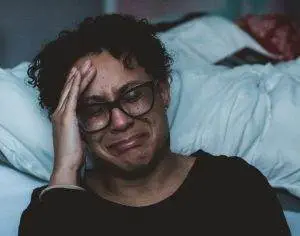
Monthly mood swings, bloated stomach, headaches, and weight gain. Why is PMS so bad? Premenstrual syndrome (PMS) is a set of symptoms that occur in the days before a woman gets her period. PMS symptoms affect every woman differently, and can be serious enough to disrupt your life every month. TCM is an effective way to deal with PMS, because acupuncture treatment can help relieve both physical and emotional symptoms of PMS and severe PMS, also known as PMDD (premenstrual dysphoric disorder).
To say that PMS is common among women is an understatement. The vast majority of women experience some changes in both their mental health and their bodies the week before their period starts. Whether or not a woman feels that it has a negative impact on her daily life may change over time. For some women, PMS isn’t a big deal; for others, it’s a major problem that can affect their relationships, impact their work, and make life hell every month.
Most women find their own particular pattern of PMS is somewhat predictable–until it isn’t. One of the most frustrating aspects of menstrual problems is the sense that things change without warning, and symptoms can come on suddenly with ferocious intensity. It can be difficult to describe how you feel before your period, because the symptoms seem to come and go. Some women find that their PMS symptoms are different from month to month. In some cases, they might find that every other month is bad, while the alternating months aren’t so bad. Why is PMS worse some months?
Other than the basic understanding that PMS is caused by fluctuations in hormones and brain chemistry, conventional medical science does not offer much in the way of clear answers about what causes PMS.
TCM provides a different framework for looking at menstrual problems and has been used to treat women’s health issues of all kinds for many centuries. TCM treatments including acupuncture, acupressure, moxibustion, and Chinese herbs can not only help relieve PMS symptoms, they can also be beneficial for other menstrual problems like irregular periods, PCOS, painful periods, endometriosis, heavy periods, fibroids, and symptoms of perimenopause.
Top 10 Symptoms of PMS
As a syndrome, PMS is considered a collection of symptoms that often appear together, in various combinations in different individuals. In the case of PMS, a woman may feel that her own symptoms change as often as every month, or gradually over the course of years. Girls in their teenage years may experience PMS in one way. Then, a woman in her early adult years may develop a different set of symptoms. After having a baby, a woman may find that her PMS symptoms have changed again. Then, many women in middle age experience changes in PMS symptoms as they go through perimenopause, approaching menopause. The most common signs of premenstrual syndrome include:
- Mood swings, low mood, feelings of sadness or anger
- Anxiety, feeling tense and irritable, cry easily or lose temper, want to be left alone
- Trouble sleeping, insomnia, disturbed sleep
- Breast tenderness, sore breasts, swollen breasts
- Food cravings, changes in appetite
- Weight gain, stomach bloating, water retention, pelvic pressure
- Gassiness, changes in digestion and elimination
- Acne, skin problems
- Changes in libido
- Headaches, migraines, difficulty concentrating, foggy head
Less obvious or well-known symptoms of PMS include: vision problems, tingling in the arms or legs, lack of coordination (clumsiness, dropping things), bruising easily, heart palpitations, dizziness, itchy skin, cold sores, toothaches, back pain, joint pain, and increased TMJ jaw pain.
Other health problems can be amplified during the premenstrual period, such as: chronic fatigue syndrome, fibromyalgia, interstitial cystitis, migraines, IBS, Meniere’s disease (dizziness, vertigo), clinical depression and anxiety disorders.
The physical and emotional aspects of PMS can affect each other, causing the typical mood swings. Feelings of sadness and frustration, or lack of sleep, may lead to comfort eating, but then the sight and sensation of your bloated stomach can cause you to feel depressed about your body. Minor problems with your spouse or co-workers can suddenly seem overwhelming and make you feel angry or helpless.
For some women, PMS symptoms are so bad that they feel unable to function the week before their period. Severe PMS is now diagnosed as PMDD.
What Is PMDD?
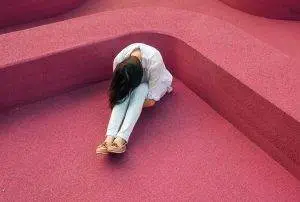
PMDD (premenstrual dysphoric disorder) is a severe form of PMS marked by intense emotional symptoms that dramatically impact a woman’s life, in addition to physical symptoms. “Dysphoria” is the opposite of “euphoria;” in other words, it is a mental state characterized by profound unhappiness and negative feelings. It is estimated that about 5% of all women experience this extreme type of PMS. Signs of PMDD include:
- Severe anxiety, panic attacks, paranoia
- Severe depression, in some cases even suicidal thoughts, lack of self-worth
- Anger and irritability that provokes rage and causes conflicts with other people
- Fatigue, low energy, inability to concentrate, feelings of confusion
- Intense food cravings, possibly leading to binge eating
Again, there is currently no scientific answer for what causes PMDD, although it is generally believed to be related to the way estrogen levels and progesterone levels change between ovulation and the onset of the menstrual period. Mood is considered to be related to serotonin levels in the brain, and this is why PMDD is usually treated with birth control pills, which suppress ovulation, and/or antidepressants (SSRIs), which affect serotonin uptake.
Medical Treatment for PMS
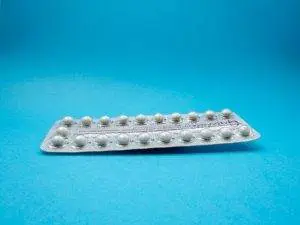
Naturally, when a woman asks for advice about PMS or PMDD, she is going to hear suggestions like: “try meditating, exercise more, eat a healthy diet, and get more sleep.” And it is true that making good lifestyle choices is an important part of helping to reduce PMS symptoms. But women who are suffering with serious PMS need solutions beyond these kinds of lifestyle guidelines.
When women complain of PMS symptoms, doctors will most often recommend OTC pain medications like ibuprofen or acetaminophen (NSAIDs) to relieve pain. Diuretics may be used to relieve bloating or premenstrual weight gain. Of course, most commonly, women are prescribed oral birth control pills, which suppress ovulation, and therefore may reduce the severity of PMS symptoms. More and more frequently, women may be prescribed antidepressants to try to deal with emotional symptoms and mood swings, or anxiety medications to take as needed during PMS. In effect, doctors often treat PMS the same way they would depression or anxiety.
Clearly, birth control pills are not helpful for women who may want to get pregnant, and some women may be concerned about how taking the pill or antidepressants may affect their fertility in the future. None of these pharmacological solutions for PMS address the root cause of the symptoms, and all of these medications carry side effects that may impact a woman’s overall health. Health care for women with TCM seeks to address the deeper internal causes of hormonal imbalances and other problems with the organ systems that are impacting the health of the ovaries and the regularity of the menstrual cycle.
Can Acupuncture Help PMS?

While it is only in recent years that conventional medicine has begun to acknowledge connections between physical health and emotional health, TCM has understood for many hundreds of years that health conditions of all kinds, especially those related to the menstrual cycle, are rooted in the balance of energies. Menstruation represents an ongoing process of transformation that occurs not only within the reproductive organs, but which affects every part of a woman, and even the people around her.
The concept of Yin and Yang in Chinese philosophy describes two opposing yet complementary forces that are constantly acting upon each other in order to achieve balance. The menstrual cycle is very much based on Yin and Yang energies; during the follicular phase of the cycle (before ovulation), Yin is increasing while Yang is decreasing, and in the luteal phase (after ovulation, before the period), Yang is increasing while Yin is decreasing. The system is designed, naturally, to create the right conditions for conception; this process of Yin and Yang exchange is what determines a woman’s fertility.
While the health of the uterus and ovaries is definitely central to the process, within the TCM philosophy, they are not the only organs involved with menstruation. The Kidneys, Liver, and Heart all have important roles to play, as well. In TCM, we also view the elements of Fire–to provide warmth, controlled by the Heart–and Water, controlled by the Kidneys–to provide moisture, as being vital to all processes within the body, especially to menstruation. Blood is cleansed, stored, and then distributed to the other organs by the Liver. Blood being central to the process of menstruation, the Liver’s role is really key in how the whole thing plays out.
According to TCM theory, most PMS and PMDD symptoms are caused by problems with Liver Qi. When the Liver Qi is out of balance, it can lead to feelings of anger, frustration, depression, and irritability. The Liver system is particularly susceptible to negative effects of stress.
There are a few different variations of Liver Qi imbalance and other patterns that can contribute to PMS symptoms:
- Liver Qi invasion – This is a condition of excess, in which there is too much rising Liver Qi, characterized by overall negative emotions that are disruptive, including anger and anxiety, breast tenderness, headaches, dizziness, and constipation.
- Liver Qi depression – In this case, there is not enough Liver Qi, causing feelings of sadness, heaviness in chest, painful swelling of breasts, sighing, bloated stomach, lack of appetite, cramping during period, scanty blood during period.
- Spleen Kidney deficiency – In this case, stagnant energy in the Kidney system is preventing water from moving appropriately, causing water retention or edema.
From the scientific medical standpoint, acupuncture treatment has been shown to have a positive effect on neurotransmitters like serotonin, and to impact levels of estrogen and progesterone. This happens naturally because we are using TCM methods to restore optimal function of all the organs. With Chinese herbs we are able to get specific nutrients into the body that we cannot get from the foods we normally eat.
Acupuncture treatment accompanied with specific herbs for PMS patterns can help balance the liver Qi, and bring all of the organs into synergistic harmony.
In order to make lasting change, it is best to have acupuncture treatment at least once or twice a week. We need to deal with each phase of the menstrual cycle as it occurs by tailoring the acupuncture treatment and herbs to your PMS and period symptoms.
A systematic review of ten controlled trials using acupuncture to treat PMS concluded that TCM treatment of PMS significantly improved symptoms.
Top 3 Tips for PMS Relief From TCM Perspective

There are still a lot of taboos surrounding women’s health, and many girls and women have never learned how to take care of their reproductive health. Working with an experienced TCM doctor will enable you to get personalized care and advice about how to eat the best diet for PMS symptoms, what activities to avoid before your period, and other female hygiene tips that you may not have heard before.
- Nutrition – conventional Western thinking about healthy eating currently focuses on eating fresh, whole foods, which is good, except that people tend to think this means eating a lot of foods raw or cold, as in salads and smoothies. According to the TCM philosophy of nutrition, though, eating cold foods is actually one of the worst things you can do when it comes to relieving PMS and painful periods. Putting a lot of cold food into the stomach cools down the temperature of the other internal organs, which can contribute to more cramping and worse cramps. During the week before your period, concentrate on eating plenty of nourishing, cooked foods like soups and stews, proteins and vegetables, and whole grains like brown rice and quinoa. Avoid too much dairy, sugar, caffeine, hot, spicy or fried foods (that includes chips and crackers), and definitely avoid icy cold beverages and frozen treats.
- Keep track of your period – there are many apps available now to help with this, but it can also be a simple chart with room for notes about your symptoms. Keeping track of your PMS symptoms every month can help you recognize patterns in your own behaviors and experiences. A record of PMS symptoms will also help you communicate what you’re feeling to your health care providers when you are seeking treatment for PMS or PMDD.
- Exercise – gentle movement modalities that move Qi through the body are great to help PMS: Tai Qi, yoga, or dancing are all good. Avoid deep twists that could squeeze or put pressure on the ovaries and other organs. Again, keep track of your exercise routines and how they affect your physical and emotional wellbeing from month to month so that you can see which type of workout is best for you, or if some types of exercise make PMS worse.
Acupuncture Near Me for PMS in Los Angeles, CA
Many women come to us at Art of Wellness seeking help with menstrual problems or fertility issues. We have over 30 years of experience in helping to relieve symptoms of PMS and all types of period pain and dysfunction. It is possible for the menstrual cycle to flow without extreme feelings or strong physical discomfort. If you feel like PMS or PMDD is negatively impacting your life every month, please do not hesitate to give us a call.
*This article is for education from the perspective of Traditional Chinese Medicine only. The education provided by this article is not approved by FDA to diagnose, prevent, treat and cure human diseases. It should not stop you from consulting with your physician for your medical conditions. Traditional Chinese Medicine is based on Qi, which is an invisible force that usually cannot be observed by modern science. Because science focuses on testing ideas about the natural world with evidence obtained through observation, these aspects of acupuncture can’t be studied by science. Therefore acupuncture and Chinese herbs are often not supported by double-blind, randomized trials, and they are considered alternative medicine therapies in the United States.
How to Quit Smoking With Acupuncture and TCM
By Xiaomei Cai, L.Ac., Ph.D. & Qineng Tan, L.Ac., Ph.D.
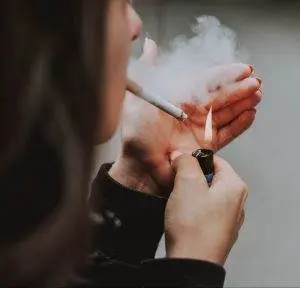
Have you been trying to stop smoking, but are having a hard time quitting? You know that quitting smoking will definitely improve your overall health and longevity, but that doesn’t mean it’s easy to do. Acupuncture treatment can reduce cravings, alleviate withdrawal symptoms of nicotine, and help relieve anxiety you feel when you stop smoking.
Smoking tobacco causes several million unnecessary deaths every year, and is associated with multiple chronic diseases, including lung disease, cardiovascular disease, diabetes, lung cancer and other types of cancer. But deaths related to smoking are just the tip of the iceberg. According to the CDC, over 16 million Americans are currently living with a chronic disease caused, at least in part, by smoking. Smoking increases the risk of stroke, erectile dysfunction in men (ED), low sperm count, and autoimmune diseases such as rheumatoid arthritis. On average, smoking takes ten years off a person’s life.
Why do we keep doing this to ourselves? Because once you have a smoking habit, quitting smoking is very hard. Tobacco contains a natural chemical called nicotine. Nicotine is a highly addictive substance. It acts upon the neurotransmitters in the brain that release dopamine: the “feel-good” chemical. When you inhale tobacco smoke, nicotine goes directly to your brain, and you get an immediate “reward” in the form of dopamine. Once your brain gets used to this reaction, it wants more of it. Even when you know you should stop smoking, and you want to quit, a part of your brain is signalling you not to stop.
Vaping, or smoking from a vape pen, or e-cigarette, is the latest trend. There has been some suggestion that this form of smoking causes less damage than cigarettes do, because Juul pens don’t have many of the toxic additives that are in regular cigarettes. So far, researchers don’t know how long-term vape use will affect people’s overall health. However, it is clear that people who vape can easily become just as addicted to nicotine as smokers of cigarettes, cigars, and pipes do.
Once the brain has become attuned to the dopamine reaction caused by nicotine, a very powerful social-emotional component is added to the physical, chemical component. Being in a place where you have smoked in the past, seeing a friend who smokes, smelling smoke in the air, and of course, seeing an ad for cigarettes–all these sorts of cues in your daily environment can have a dramatic impact on your desire to smoke.
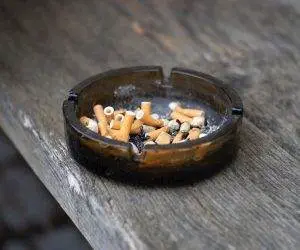
Almost half of all smokers in the U.S. make an attempt to quit smoking each year. But, obviously, people fail in their attempts to stop smoking all the time. Nicotine withdrawal symptoms include intense anxiety. When faced with a powerful combination of physical and emotional stress, most people will return to that quick fix. Even when a person develops serious problems due to smoking, like a constant cough, emphysema, sleep apnea/snoring, infertility, acid reflux/heartburn, loss of smell and taste; even when a person knows that second hand smoking can hurt their loved ones, they still may find it impossible to quit. People need help to quit smoking.
Typical smoking cessation aids include nicotine gum or patches, medications, and programs designed to educate and support people as they try to overcome smoking addiction. While these methods offer help, they do not work for everybody. Most people have to try to quit smoking many times and try different methods before finding success.
Many people gain weight when they quit smoking, because the cravings for a cigarette are replaced by cravings for sweets or other foods and drinks that keep your hands and mouth occupied. It’s more than just an oral habit, though; nicotine affects the way your body uses insulin and releases glucose, so when you quit smoking, there is a very real change in blood sugar levels and a subsequent desire to eat more carbohydrates. When it feels like you have to choose between two different risk factors–being a smoker, or being overweight–,it may seem like a hopeless situation.
TCM for smoking cessation offers a different, multi-pronged approach. With acupuncture treatment for nicotine addiction, we can work on several of the problems smoking causes at the same time. Using acupuncture to stimulate specific pressure points for reducing cravings and alleviating symptoms of smoking withdrawal is only one way that TCM can help people quit smoking and regain good health. Our TCM detox program may also be helpful.
Top 10 Symptoms of Nicotine Withdrawal
When you try quitting smoking “cold turkey,” you will probably feel more severe symptoms of withdrawal for the first few days. Withdrawal symptoms can last for several weeks. Nicotine withdrawal symptoms include:
- Intense cravings for a cigarette that last for 5-10 minutes
- Feelings of anxiety and stress
- Food cravings, weight gain, rise in blood sugar
- Sleep problems, insomnia
- Persistent cough, “smoker’s cough”
- Flu-like symptoms: fever, fatigue, body ache, headache
- High blood pressure, fast heart rate
- Memory problems, difficulty concentrating
- Dizziness
- Constipation, bloated stomach
Medical Approach to Quitting Smoking
Nicotine replacement therapy (NRT) has been the common form of help for nicotine withdrawal for decades. This involves using nicotine patches, nicotine gum, or lozenges, which help people gradually wean themselves off of nicotine by lowering the dose over time. Nicotine patch side effects can include a rapid heart beat, dizziness, headaches, and nausea.
Medications such as Zyban and Chantix are also used to help people quit smoking. Zyban (Bupropion) is also known as Welbutrin, which is used to treat depression. A prescription medication called Varenicline (Chantix) is the newest medical treatment available to help people stop smoking. Varenicline works by blocking the receptors in the brain that react to nicotine to stimulate dopamine production. Varenicline is still fairly new, and researchers do not yet know the long-term effects of taking it. Common Chantix side effects include nausea, insomnia, and headaches; more serious psychiatric reactions, such as depression and suicidal ideation have also been reported. Drug interventions for smoking cessation are more effective when combined with education and counseling.
The most effective methods to help people stop smoking treat both the brain chemistry that is causing nicotine addiction and the emotional symptoms that arise when quitting. TCM methods of acupuncture and herbs are naturally able to help address addiction because they work on the whole person–physically, mentally, and spiritually.
How Can Acupuncture Help You Quit Smoking?

In conventional medical terms, we mostly think of cigarette smoking as being harmful to the lungs, due to smoke inhalation, and the cardiovascular system, due to the well-known fast heartbeat we associate with nicotine use. In TCM, we do consider that smoking weakens the lungs, but this, in turn, causes problems in the other major organ systems of the body. A buildup of heat in the Heart and Stomach can lead to stagnant Liver Qi. These forces are what cause the withdrawal symptoms of anxious feelings, heart palpitations, irritability, food cravings, and poor sleep. With acupuncture and herbs, we work to clear heat and detoxify the lungs and all of the organs.
A specific set of points on the outer ear are often used to help combat the cravings associated with overcoming addictions of all kinds, including nicotine dependence. Often we will send a patient home with small ear seeds fixed to these points so that they can be squeezed and stimulated whenever you feel an urge to smoke. This will also help with food cravings and prevent overeating and weight gain when you quit smoking.
Acupuncture helps to release endorphins, replacing the familiar dopamine hit with a different sense of relaxation. Endorphins promote a sense of wellbeing and relieve pain. Dopamine works on the reward center of the brain, causing a mental and emotional reaction that leads to addiction. Acupuncture treatment works holistically to help relieve emotional pain–symptoms of anxiety and depression–by positively impacting neurochemical activity. Shifting from dopamine dependence to more abundant endorphins and serotonin will help restore restful sleep.
A controlled trial study compared patients who received acupuncture, patients who received acupuncture and education and counseling, and patients who received sham acupuncture to help them quit smoking over a period of four weeks. The percentage rate of patients who had quit smoking after 18-month follow up was highest among those who received acupuncture, and especially highest among those who had acupuncture and counseling.
A study of almost 3000 people who received acupuncture treatment for smoking over an eight week period showed that the treatment helped many people abstain from cigarettes, and helped many more to cut back on how many cigarettes they smoked.
Chinese Medicine Near Me to Stop Smoking in the Great Los Angeles Area
The decision to quit smoking for good can be a life-changing one. But for most people, it’s also one of the most difficult things they will ever do. Cigarettes are addictive, and to stop smoking, you may need professional help. If you’ve already tried NRT and not been able to finally quit, you may want to consider trying the TCM approach. Whether you chain smoke or only vape socially, whether you are quitting smoking because you want to increase your chances of getting pregnant, or you have lung cancer stage 4, it is never too early or too late to stop smoking. Acupuncture for smoking cessation can help you get past the cravings for cigarettes that make it so hard to quit. Acupuncture and herbs can not only help you kick the habit, but can also help you get rid of that cough, brighten your skin, and sleep better. Most of all, you will have made an important choice to prioritize your health and prevent chronic illness from taking hold later in life.
*This article is for education from the perspective of Traditional Chinese Medicine only. The education provided by this article is not approved by FDA to diagnose, prevent, treat and cure human diseases. It should not stop you from consulting with your physician for your medical conditions. Traditional Chinese Medicine is based on Qi, which is an invisible force that usually cannot be observed by modern science. Because science focuses on testing ideas about the natural world with evidence obtained through observation, these aspects of acupuncture can’t be studied by science. Therefore acupuncture and Chinese herbs are often not supported by double-blind, randomized trials, and they are considered alternative medicine therapies in the United States.
